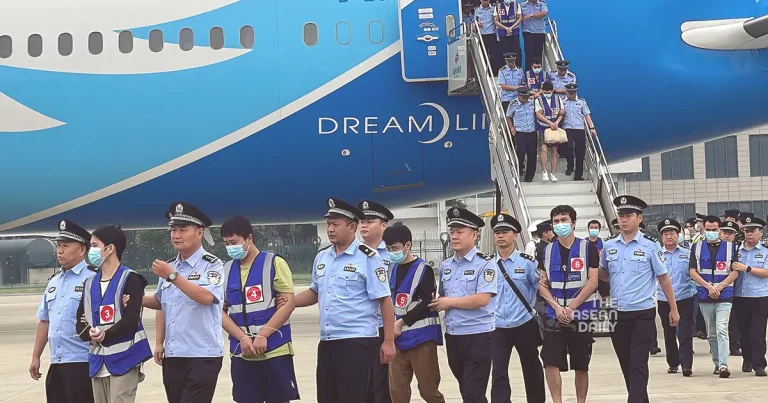25-9-2023 (SINGAPORE) Criminal syndicates hailing from China have been extending their influence across the Asia-Pacific region, establishing operational bases in countries like the Philippines, Australia, and Singapore to launder their illicit proceeds. These criminal networks are now believed to have amassed billions in capital.
In February 2023, Australian law enforcement arrested nine Chinese nationals in a series of raids conducted in Sydney. This syndicate in Australia is alleged to have operated a shadow banking system catering to criminal organizations. Among those apprehended was Steven Xin, the Australia-based business partner of Macau’s gambling kingpin Alvin Chau, who was recently sentenced to 18 years in China for illegal gaming and other offenses.
Jason Tower, the country director for the Myanmar program at the United States Institute of Peace (USIP), noted the extensive reach of these criminal organizations. According to Tower, these networks have established control over territory in Myanmar through partnerships with border guard forces under the Myanmar Army and other local militias. These criminal syndicates also have a presence in Cambodia and Laos and have expanded their interests into major financial hubs worldwide, including London, Dubai, and Singapore.
Tower explained that these criminal networks have evolved over time. Originally, they provided offshore gambling services until the Covid-19 pandemic prompted a crackdown, leading them to shift their focus towards large-scale scam operations. Their operations began in the Philippines in the early 2010s, where they set up online gambling sites and casinos targeting Chinese nationals. Online gambling is prohibited in China. However, with the joint efforts of Chinese and Philippine law enforcement to crack down on illegal online casinos in 2016, these operators moved to Sihanoukville, Cambodia.
From late 2017 until the middle of 2019, Cambodia essentially allowed unregulated gambling in Sihanoukville, even licensing it. Chaos ensued as Chinese gangs committed violent crimes, provided security to the casinos, and enforced payments from indebted players. A video from May 2019 demonstrated the extent of their influence, with a Chinese gang leader warning other groups about their dominance in Sihanoukville.
By August 18, 2019, Cambodia’s Prime Minister Hun Sen issued a directive to ban online gambling. By October of that year, many of these criminal organizations relocated to Myanmar.
The report by Tower highlighted three cities of concern in Myanmar that operate in special economic zones (SEZs): Saixigang Industrial Zone, Huanya International City, and Yatai International City in Myawaddy township in Karen state. These “spinach cities,” as they are known, host unregulated gambling operations and are promoted as megacities featuring high-end housing, casinos, and international airports. However, their actual operations deviate from their purported purposes.
The Saixigang Industrial Zone was constructed with investments from “Broken Tooth” Wan Kuok-Koi, a triad leader who was sentenced to 13 years in jail in Macau in 1999 for money laundering, criminal association, and attempted murder. After his release in 2012, Wan founded the World Hongmen History and Culture Association, allegedly expanding criminal activities throughout South-east Asia. Similarly, the Huanya International City project is reportedly owned by Chinese-Thai Yu Jianjun. The Karen state government demanded that construction be halted due to a lack of government approval, but the project reportedly continues.
Chinese law enforcement agencies have recently intensified their cooperation with South-east Asian counterparts to combat transnational crime, including money laundering, human trafficking, and cyberscams. As reported by Professor Zachary Abuza of the National War College in Washington, Beijing’s proactive approach stems from the increasing number of Chinese nationals falling victim to scams and other crimes within South-east Asian countries. Hundreds of thousands of people have been trafficked by these criminal networks and forced to work in scam centers and other illegal online operations that have proliferated across the region.
In August 2022, Thai authorities arrested She Zhijiang, a China-born individual and the owner of Yatai International City. His extensive network of companies, used for money laundering, led to arrests in Myanmar, Laos, and Cambodia. The information provided by China played a crucial role in these apprehensions.
Despite efforts to curb these activities, estimating the total number of Chinese syndicates in the region remains challenging. Beyond major players who run large compounds, numerous smaller crime syndicates rent rooms within these compounds to conduct their operations. Recently, in September, Chinese law enforcement collaborated with Myanmar’s rebel United Wa State Army to raid 11 scam centers, arresting 269 people, including 186 Chinese nationals, who were immediately deported to China. The ongoing battle against these criminal networks requires continued vigilance and cooperation.




